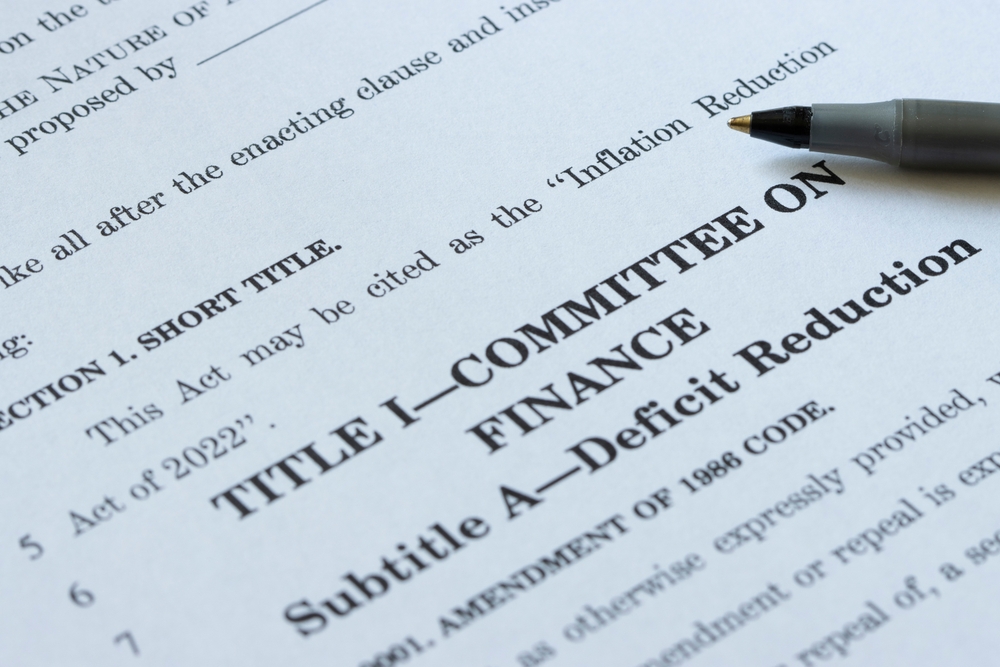After passing the House and Senate, President Joseph Biden Jr. signed the Inflation Reduction Act (IRA) of 2022 into law on August 16, 2022.
Although significantly pared down from its predecessor, the Build Back America bill, it is the largest federal commitment to date to address climate change.
The law provides $369 billion in funding for pollution reduction, domestic manufacturing of solar panels and batteries, and tax breaks for electric vehicles and clean energy products. There are also incentives for industry to reduce emissions through carbon capture and transitioning to low-carbon inputs and more energy-efficient manufacturing processes.
Methane reduction was the primary pollutant addressed by the bill. Industry emitting above a specific level of methane will incur escalating fees over time. A new methane royalty tax was put into place for methane extracted from public lands, including methane from flaring and venting. There’s also funding for additional methane monitoring by the EPA.
Other provisions took aim at reducing greenhouse gas (GHG) emissions, such as hydrofluorocarbons (HFCs) and other “criteria” pollutants regulated by the Clean Air Act (CAA).
Royalty rates for oil industry production on federal lands increased, and the minimum bid threshold went up from $2 to $10 per acre.
Offshore leasing for wind energy is increased in the IRA under the condition that large tracts of oil and gas leases are offered on the outer continental shelf.
Funding is included for several programs to promote reduced GHGs in agriculture, such as carbon sequestration and better climate resiliency for forests and farms.
The IRA provides federal funding to support the development and production of alternate sustainable fuels, such as hydrocarbon and biofuels.
“There’s $60 billion for overall environmental justice priorities: $15 billion of that funding goes to a host of priorities like clean energy and emissions reductions specifically for low-income and disadvantaged communities,” says Vox. “Community groups, governments, and tribes can also qualify for $3 billion in block grants for programs like cleaning up abandoned mines, monitoring air quality, and improving extreme weather resilience. And the law contains $3 billion to restore and reconnect communities that are divided by highways.”
EPA’s worsening workforce woes
All of these new programs will place further strain on the EPA workforce, which is already short-staffed and struggling to carry out the directives enacted by the November 2021 Infrastructure bill.
“The EPA’s staffing levels essentially have been static since President … Biden took office,” notes Bloomberg Law. “The agency reported 14,581 employees in fiscal 2022, a figure that’s almost 20% less than the EPA’s high-water mark under the Clinton administration.”
Among the greatest personnel needs at the Agency are technical personnel with air emissions and fuels experience to set tax credit parameters and issue grants, said John Miller, a former branch chief at the Federal Energy Regulatory Commission’s enforcement office and now a director at Cowen Inc.’s Washington Research Group, the Bloomberg Law article says.
“Other areas of need will include climate change scientists and environmental engineers at the regional level, as well as grants specialists to help communities apply for grants and review submissions,” said Jacob Carter, research director at the Union of Concerned Scientists’ Center for Science and Democracy and a former EPA postdoctoral research fellow, according to Bloomberg Law.
The federal hiring process is slow, and the EPA must compete for specialized scientific talent. With the Agency already woefully behind on current mandated tasks such as National Emission Standards for Hazardous Air Pollutants (NESHAP) and New Source Performance Standards (NSPS) updates, it remains to be seen if the Agency will be successful in effectively administering the new programs funded in the IRA.

